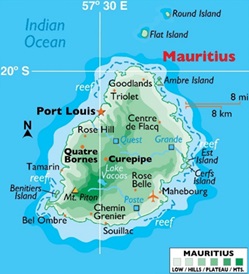(Prelims: Current Events of International Importance)
(Mains, General Studies Paper-1: Distribution of major natural resources around the world, location- important geographical features (including water bodies and ice cover) and changes in flora and fauna and their effects, ) |

Reference
The island nation of Mauritius is facing a severe water crisis. Climate change, increasing population and inadequate water management have made this crisis more severe. In recent years, the level of Mauritius's reservoirs has fallen rapidly from 92.6% to just 38.2% in the year 2024.
Causes of Mauritius's water crisis
- Climate change and decreasing rainfall: Analysis of the rainfall pattern of the last 89 years (1931-2020) in Mauritius shows that rainfall has decreased. Tropical cyclones and warming oceans are making climate patterns more erratic, making droughts more severe and frequent.
- Growing population and water demand: Mauritius had a population of 479,000 in 1950, which increased to 1.26 million in 2022. Population growth has increased pressure on water resources, especially in the central plateau and coastal areas, where industry, agriculture and business consume large amounts of water.
- Old water infrastructure: Mauritius' water supply is dependent on rivers, springs and groundwater. However, overexploitation of groundwater and old pipelines have led to a huge loss of resources, with 60% of water leakage in 2020.
- Ineffective water management: Excess water from rivers flows into the sea during rainfall, with no effective system to store it. In addition, supply by water trucks is expensive and insufficient.
Effects of water crisis
- Effects on agriculture and livelihoods: Sugarcane production is important in Mauritius' economy, but the ban on sugarcane irrigation due to water crisis is affecting the livelihood of farmers.
- Industry and business: Water shortage in the central plateau and coastal areas has affected high water consuming industries.
- Social impact: The water crisis has affected the welfare of local communities. Strict restrictions on water use (such as ban on washing cars, irrigating gardens and filling swimming pools) have been implemented. Violators are being fined.
- Environmental impact: Excessive exploitation of groundwater and climate change have imbalanced the ecosystem, threatening long-term water security.
Adaptation strategies
A team of researchers from Mauritius, France, the US and Kenya has suggested the following strategies to deal with the water crisis:
- Construction of mini reservoirs: 10 mini reservoirs should be built in Mauritius, which can store natural water flow. These reservoirs can store 5,00,000 cubic metres of water which will help in stable supply during droughts.
- However, the construction of these reservoirs will cost around US$100 million, which is a huge amount for a small island nation.
- Blended Finance: The Mauritian government should seek concessional public financing from institutions like the Green Climate Fund, which includes part loan and part grant.
- Apart from this, technical assistance and co-financing can be arranged from regional development banks.
- Nature-based solutions
- Wetlands restoration: Wetlands can be cleaned and restored by involving communities which will increase the water holding capacity of the land.
- Urban forests: Tree plantation in urban areas will help in water conservation.
- Water-sensitive urban design: Measures like green roofs, permeable pavements and rain gardens will help in groundwater recharge.
- Smart Water Management Technologies
- Smart Water Meters: These meters can reduce wastage by providing information on water level and leakage.
- Remote Sensing and GIS: These technologies will help monitor water use and wastage.
- Upgrading Old Pipelines: Replacing old pipelines is essential to reduce leakage.
- Community-Based Water Conservation: Promoting water conservation at the household level is important as households are the largest water users in Mauritius. Fixing leaks and community-based water conservation initiatives can save water on a large scale.
- Communities should be encouraged to adopt rainwater harvesting systems.
- Policy Reforms and Private Sector Participation: The government should create policies that enable partnerships with the private sector. Water systems can be optimized by combining grants and private investment from international climate initiatives.
- Infrastructure upgradation like increasing the height of dams should also be considered.
|
About Mauritius

- Introduction: Mauritius is an island country located in the Indian Ocean, about 900 km southeast of the coast of the African continent and east of Madagascar.
- Structure: It is formed by underwater volcanic eruption.
- Included Islands: It includes the main island Mauritius as well as Rodrigues, Agalega and St. Brandon (Cargados Carajos Shoals).
- Area: 2,040 sq. km.
- Capital: Port Louis
- Political System: Parliamentary Democracy
- Currency: Mauritian Rupee
|



